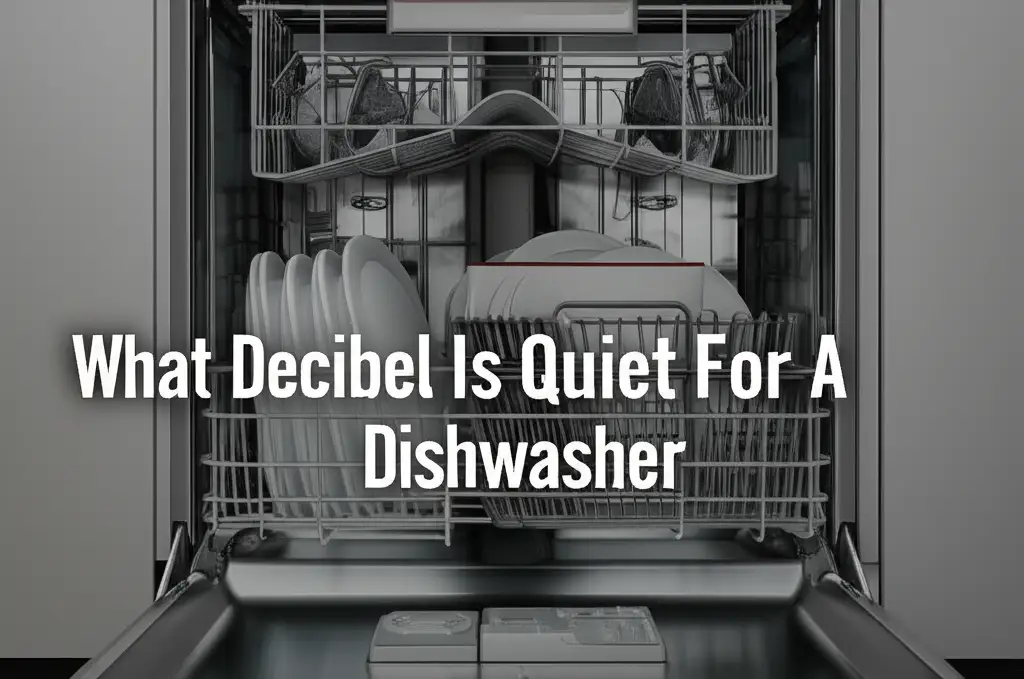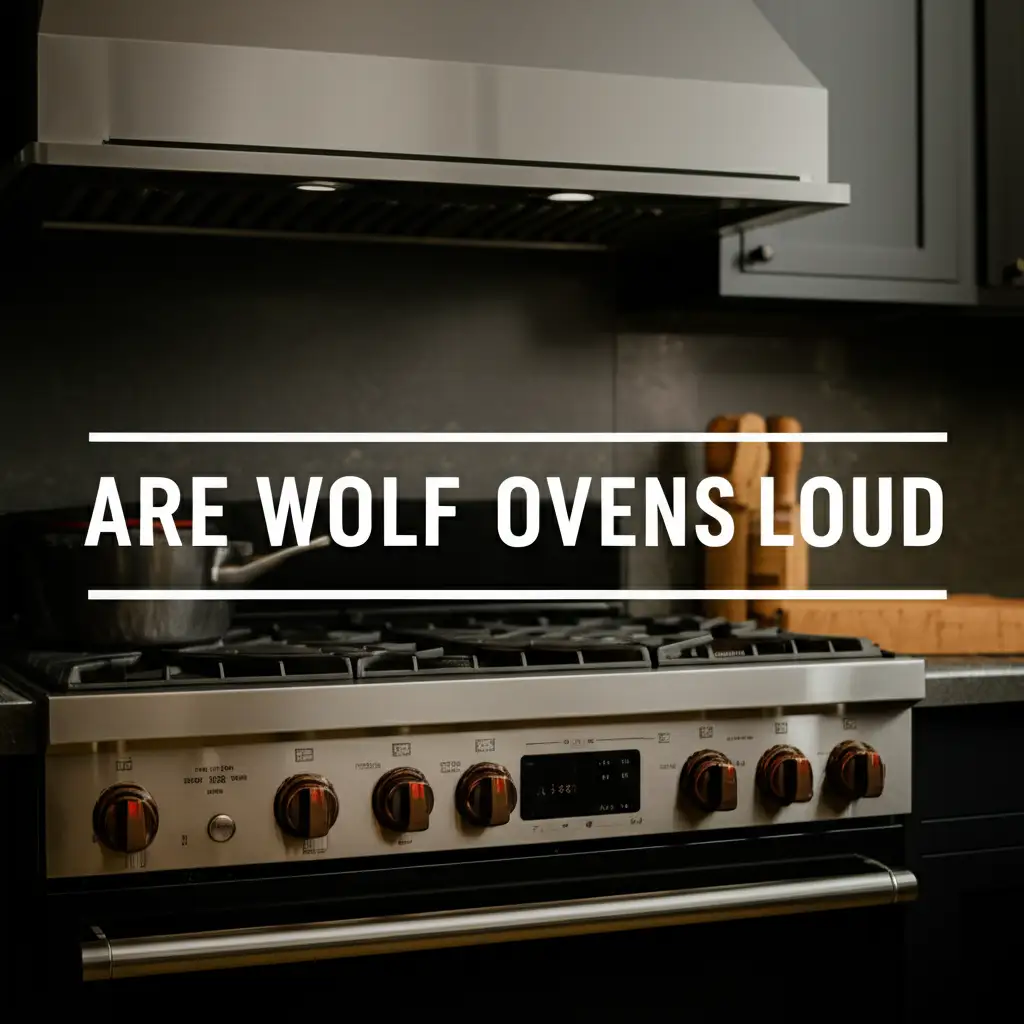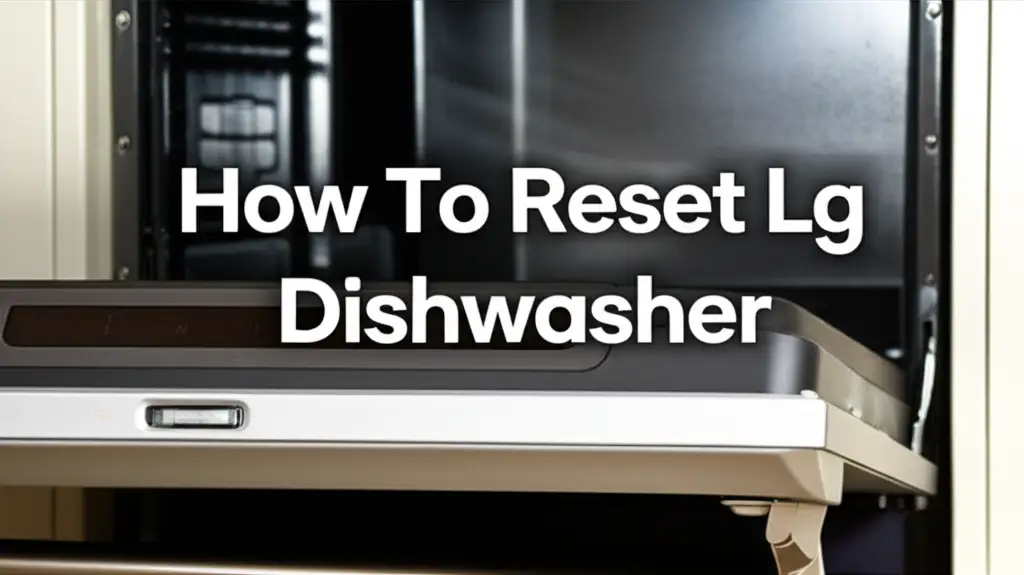· Mason Everett · Home Appliances · 12 min read
What Decibel Is Quiet For A Dishwasher

Finding Peace: What Decibel is Quiet for a Dishwasher?
The hum of a running dishwasher can quickly turn from background noise to an annoyance. Especially in modern homes with open-concept designs, a noisy appliance disrupts peace. Many people wonder, “what decibel is quiet for a dishwasher?” Understanding decibel ratings helps you make an informed choice. It ensures your kitchen remains a calm and comfortable space.
This article explores dishwasher decibel levels in detail. We will explain what constitutes a quiet dishwasher. We also look at factors that affect appliance noise. You will learn how to choose a silent model. We provide tips for keeping your current dishwasher running quietly. Get ready to enjoy a more peaceful home environment.
Takeaway
- Understanding dB: Decibels measure sound intensity. Lower numbers mean quieter operation.
- Quiet Range: A dishwasher operating between 40-45 dB is considered quiet. Below 40 dB is very quiet or “silent.”
- Key Factors: Look for stainless steel tubs, good insulation, and advanced motors.
- Maintenance Matters: Regular cleaning and proper loading help keep your dishwasher quiet.
- Check Ratings: Always verify the decibel rating on the appliance specifications before buying.
A quiet dishwasher generally operates at a decibel level of 45 dB or lower. Many premium models achieve 40 dB or less, offering very quiet operation. For most people, a dishwasher producing sound in the low 40s dB range blends into the background noise, providing a peaceful home environment.
Understanding Dishwasher Sound: Decibels Explained
Sound surrounds us every day. We measure sound intensity using a unit called the decibel (dB). This unit helps us understand how loud or quiet something is. A higher decibel number means a louder sound. A lower number means a quieter sound.
Sound perception is not linear. A 10 dB increase feels twice as loud to our ears. For example, 60 dB sounds twice as loud as 50 dB. This difference matters greatly when choosing home appliances. Knowing this helps set realistic expectations for appliance noise. It also makes sense of manufacturers’ specifications.
Common sounds provide helpful reference points for decibel levels. A soft whisper registers around 30 dB. Normal conversation usually falls within 50-60 dB. A busy street can reach 70-80 dB. These examples help compare dishwasher noise to everyday sounds. Appliance manufacturers test and report their dishwasher’s decibel rating. This rating typically represents the average noise level during a wash cycle.
What Decibel Level Defines a Quiet Dishwasher?
When searching for a quiet dishwasher, the decibel rating is your most important guide. Dishwashers come with varying noise levels. These levels range from very loud to nearly silent. Understanding the typical ranges helps set your expectations. It also guides your purchase decision.
Most dishwashers on the market today fall between 38 dB and 60 dB. A dishwasher operating at 50 dB or higher is noticeably loud. You will hear it running clearly from another room. These models can disrupt conversations or quiet activities. This sound level is common in older or budget-friendly appliances.
A dishwasher between 46 dB and 49 dB is considered average. You will still hear it, but the sound is less intrusive. Many standard models fall into this range. They offer a balance between performance and noise. However, for open living spaces, this might still be too loud.
A truly quiet dishwasher operates at 45 dB or lower. Models rated between 40 dB and 45 dB are generally considered quiet. They produce a soft hum that easily fades into background noise. If you want a peaceful home, target this range. Dishwashers operating below 40 dB are exceptionally quiet. Some models even go down to 38 dB or 39 dB. These are often labeled “silent” and are ideal for sensitive ears or very quiet homes. For more details on choosing appliances, consider reading our guide on what to look for in a dishwasher 2023.
Factors Influencing Dishwasher Noise Levels
Several design and material choices impact how much noise a dishwasher makes. Manufacturers use different technologies to reduce sound. Understanding these factors helps you identify truly quiet models. It also explains why some dishwashers are louder than others.
One major factor is insulation. Quality dishwashers use layers of sound-absorbing materials. These include bitumen, cotton, and even heavy asphalt sheets. This insulation wraps around the tub and motor. It traps sound within the appliance. Cheaper models often have less insulation, leading to more noise escaping.
The material of the dishwasher tub also plays a role. Stainless steel tubs are better at dampening sound than plastic tubs. Stainless steel is denser and absorbs vibrations more effectively. Plastic tubs tend to resonate sound more, making the appliance louder. Stainless steel also resists staining and retains heat better.
The motor and pump design significantly affect noise. Modern quiet dishwashers use brushless DC motors. These motors operate more smoothly and efficiently. They produce less mechanical noise compared to older, AC motors. The wash system design, including the spray arms and water jets, also contributes. Efficient water delivery systems reduce water turbulence noise. Furthermore, proper installation ensures a quiet operation. A dishwasher needs to be level and secure. This prevents vibrations and rattling noises. You can find more tips on proper appliance handling, such as how to move dishwasher without scratching floor.
Why a Quiet Dishwasher Matters for Your Home
The appeal of a quiet dishwasher extends beyond just avoiding annoying noise. It profoundly affects daily life and the overall comfort of your home. A noisy appliance can disrupt various aspects of your routine. Choosing a quiet model improves your living experience.
In open-concept living spaces, the kitchen is often part of a larger area. This might include the living room or dining room. A loud dishwasher in such a setup means its noise spreads throughout the main living space. This can interfere with conversations, TV watching, or simply relaxing. A quiet dishwasher allows seamless activity. It maintains the intended flow and peace of your home design.
For those who work from home, a quiet environment is crucial. Constant background noise from appliances can break concentration. It can also interfere with virtual meetings. A silent dishwasher helps create a productive workspace. You can run cycles during the day without interruption. This becomes even more important if your home office is near the kitchen.
A quiet dishwasher also enables convenience. You can run it at night without disturbing sleep. This is ideal for taking advantage of off-peak electricity rates. It also ensures clean dishes are ready in the morning. A peaceful home environment contributes to well-being. Reduced noise stress makes your home a more restful sanctuary. It adds tangible value to your daily life.
Choosing a Quiet Dishwasher: Key Considerations
Selecting a quiet dishwasher involves more than just picking a brand. You need to look at specific features and ratings. This ensures you bring home an appliance that meets your noise expectations. Making an informed decision saves you from future regrets.
First, always check the decibel (dB) rating. This number is usually prominently displayed on the energy guide label or in the product specifications. Aim for models rated 45 dB or lower for quiet operation. As discussed, below 40 dB is exceptionally quiet. Do not rely solely on terms like “silent” or “whisper-quiet” in marketing materials. Always verify the actual dB number.
Consider the tub material. Stainless steel tubs generally offer better sound dampening than plastic tubs. They absorb vibrations and keep noise contained. Stainless steel tubs also resist stains and odors better. This contributes to the overall longevity and performance of the appliance.
Look for advanced insulation and motor technology. Dishwashers with multiple layers of insulation will be quieter. Brushless DC motors are another indicator of quiet performance. They run smoother and more efficiently. Some models offer specific quiet cycles or delayed start options. These features allow you to run the dishwasher during off-peak hours or when you are not home. For a broader view on purchasing decisions, refer to our guide on what to look for in a dishwasher 2023. Lastly, read reviews from other users. Real-world experiences can confirm how quiet a model truly is.
Maintaining Your Dishwasher for Optimal Quiet Performance
Even the quietest dishwasher can become noisy over time if not properly maintained. Regular care prevents common issues that lead to increased sound levels. Simple steps keep your appliance running smoothly and quietly. Neglecting maintenance can cause various operational problems.
The dishwasher filter is a prime suspect for noise issues. A clogged filter restricts water flow and causes the pump to work harder. This increased effort generates more noise. It can also lead to poor cleaning performance. Make it a habit to clean your dishwasher filter regularly. Most manufacturers recommend cleaning it at least once a month. Some even suggest weekly checks. For detailed instructions, read our article on how often should you clean your dishwasher filter.
Proper loading also impacts noise. Overloading the dishwasher can cause dishes to rattle against each other. It can also block spray arms, making them hit dishes or the tub. This creates clanking sounds. Ensure proper spacing between items. Make sure tall items do not obstruct the spray arm rotation. This simple step can greatly reduce operational noise.
Periodically check the spray arms for blockages. Food particles can clog the small holes. This affects water pressure and flow, leading to unusual sounds. You can easily remove and clean most spray arms. Also, ensure no foreign objects, like small bones or broken glass, are in the bottom of the tub. These can get into the pump and cause loud grinding noises. If your dishwasher has drainage issues, which can also contribute to noise, check our guide on how to get the dishwasher to drain. For general cleaning to prevent buildup and noise, consider using vinegar as outlined in where to put vinegar in dishwasher to clean.
Debunking Common Dishwasher Noise Myths
Many misconceptions exist about dishwasher noise. These myths can sometimes lead to poor buying decisions. Understanding the facts helps you choose and maintain your appliance effectively. Let’s look at some common beliefs about dishwasher sound.
One common myth is that all budget dishwashers are inherently loud. This is not entirely true. While higher-end models often feature advanced noise reduction technology, some affordable options offer good quiet performance. Manufacturers are constantly improving designs. It is possible to find budget-friendly dishwashers with decibel ratings in the mid-40s dB range. Always check the specific decibel rating instead of assuming based on price.
Another myth suggests that a louder dishwasher means more powerful cleaning. This belief is outdated. Modern dishwashers use advanced technology for effective cleaning. They do this without needing excessive noise. Powerful water jets and efficient motors clean dishes thoroughly. They do not rely on brute force and noise. A quiet dishwasher can be just as effective, if not more, than a noisy one. It uses intelligent wash cycles and optimized water delivery.
Lastly, some people believe you cannot improve a noisy dishwasher’s performance. This is also false. While you cannot turn a 60 dB dishwasher into a 38 dB one, you can make it quieter. Proper loading, regular filter cleaning, and checking for obstructions help a lot. Ensuring proper installation and leveling also reduces vibrations. These maintenance steps address common causes of increased noise. They can significantly improve your current dishwasher’s sound profile.
Frequently Asked Questions (FAQ)
Q1: Is 48 dB quiet for a dishwasher?
A dishwasher operating at 48 dB is generally considered an average noise level. It is not “silent” but also not excessively loud. You will notice it running, especially in a quiet home. However, it is quieter than older models. For open-concept living or very quiet environments, you might prefer a lower decibel rating, closer to 45 dB or below.
Q2: What is the quietest dishwasher dB level available?
The quietest dishwashers on the market today can achieve decibel levels as low as 38 dB or 39 dB. These models are often described as virtually silent. You might only hear the gentle sound of water. They use advanced insulation, brushless motors, and stainless steel tubs to minimize noise.
Q3: What makes a dishwasher noisy during operation?
Several factors can make a dishwasher noisy. These include an old or inefficient motor, inadequate sound insulation, and a plastic tub. Blocked spray arms, a clogged filter, or foreign objects in the pump also cause noise. Improper installation, like uneven leveling, can also lead to vibrations and rattling sounds.
Q4: Does a stainless steel tub make a dishwasher quieter?
Yes, a stainless steel tub generally helps make a dishwasher quieter. Stainless steel is a denser material compared to plastic. It absorbs and dampens sound vibrations more effectively. This helps keep the wash cycle noise contained within the appliance. It contributes to a more peaceful kitchen environment.
Q5: How can I make my current dishwasher quieter?
You can take several steps to make your existing dishwasher quieter. Regularly clean the filter and spray arms to ensure clear water flow. Load dishes properly to prevent rattling and blockages. Check that the dishwasher is level and securely installed. Look for any loose parts or foreign objects inside the tub.
Q6: Do high-end dishwashers always mean quiet operation?
While many high-end dishwashers are designed for quiet operation, it is not always a guarantee. Most premium models do feature lower decibel ratings. They often incorporate advanced noise-reduction technologies. However, always check the specific decibel rating (dB) in the product specifications. This provides the exact noise level before purchase.
Conclusion
Understanding what decibel is quiet for a dishwasher empowers you to make excellent choices. A peaceful kitchen contributes greatly to a harmonious home. Knowing that a truly quiet dishwasher operates at 45 dB or lower helps guide your search. You can now prioritize quiet operation when buying a new appliance.
Consider factors like insulation, tub material, and motor type. These all contribute to a dishwasher’s overall noise level. Also, remember that proper maintenance keeps your current dishwasher running quietly. Regularly cleaning filters and loading dishes correctly prevents unnecessary noise. By focusing on these elements, you ensure your kitchen remains a calm and comfortable space. Make the switch to quiet and enjoy the serenity.
```json
{
"publishDate": "2025-06-26T00:00:00Z",
"title": "What Decibel Is Quiet For A Dishwasher",
"excerpt": "Discover what decibel is quiet for a dishwasher and learn how to choose a silent model for a peaceful home.",
"image": "https://res.cloudinary.com/dky6urpy2/image/upload/v1750862027/blog_image_1750862027_cblrco.webp",
"category": "Home Appliances",
"tags": [
"quiet dishwasher",
"decibel levels",
"dishwasher noise",
"appliance sound",
"dB rating"
],
"metadata": {
"canonical": "https://www.cosyhomecreation.com/what-decibel-is-quiet-for-a-dishwasher"
}
}




